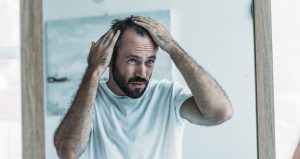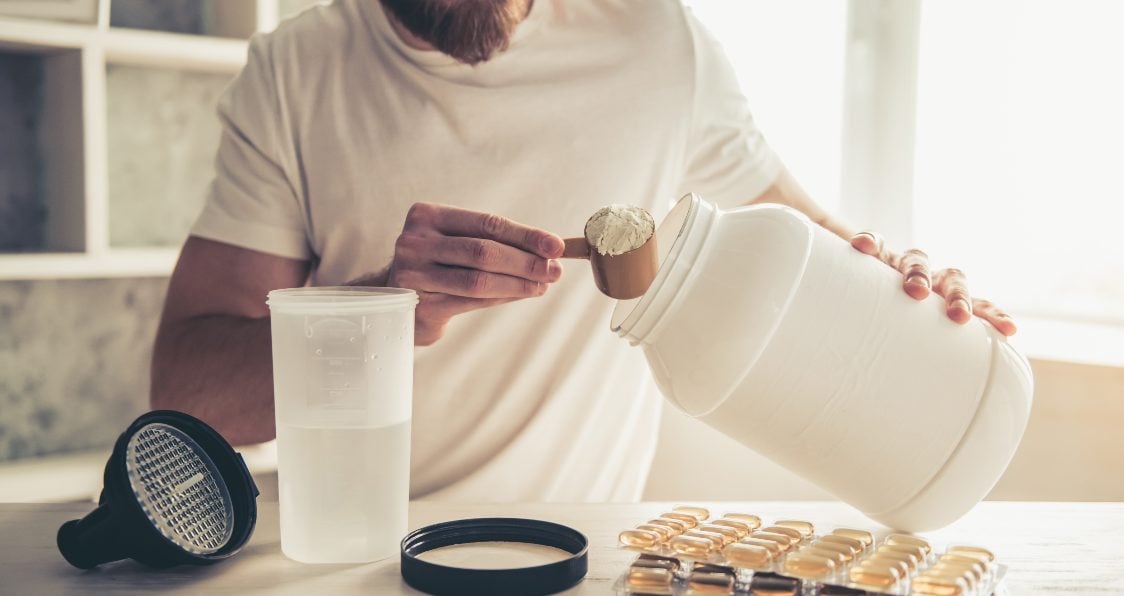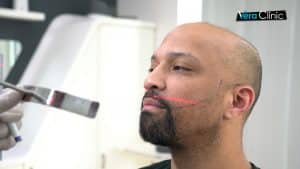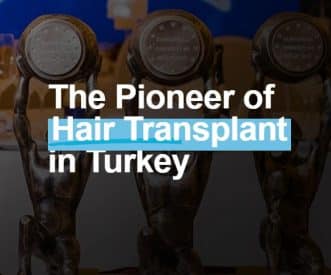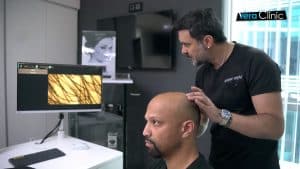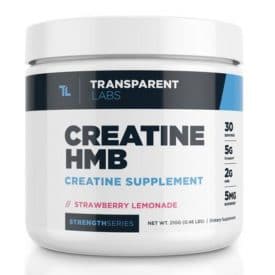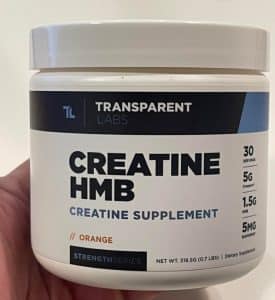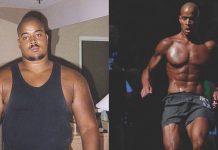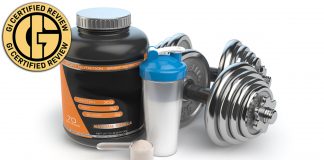Creatine and Hair Loss: Misconception or Real Concern?
Creatine is a popular supplement among athletes and fitness enthusiasts, known for its ability to enhance muscle growth and improve performance. While there are numerous benefits to using creatine supplements, there are also some concerns about its side effects. One of the most common questions asked by people who use creatine is whether it causes hair loss or not. Let’s explore the connection between creatine and hair loss and provide you with all the essential information you need to know.
Let’s take a closer look at what creatine is, how it works, its benefits and potential side effects, as well as the causes of hair loss and misconceptions surrounding it. So, if you’re worried about losing your luscious locks due to creatine consumption, read on to learn more.
Understanding the Basics: What is Creatine?
Creatine is a compound that can be found in muscles. You get some of it through foods such as meat and fish, and it aids in supplying energy for high-intensity activities. Athletes and bodybuilders often use creatine supplements to enhance their muscle strength and power. Before incorporating any new dietary supplement, it’s essential to consult with a healthcare professional.
Purpose and Benefits of Creatine Supplements
Creatine supplements offer a range of benefits for athletes and fitness enthusiasts engaging in physical activity. By increasing phosphocreatine levels in the muscles, these supplements can improve athletic performance, particularly in high-intensity, short-duration activities. One of the primary benefits of creatine supplementation is its ability to aid in increasing muscle mass and strength during physical activity. Not only can these supplements reduce fatigue, but they also enhance exercise recovery, allowing individuals to push themselves harder during their workouts.
It’s important to note that proper dosage and hydration are crucial when using creatine supplements to maximize their effectiveness. So, if you’re looking to take your athletic performance to the next level during physical activity, incorporating creatine supplements into your routine may be worth considering.
Unveiling the Side Effects of Creatine Supplements
Creatine supplements are generally considered safe when used as directed. Some individuals may experience gastrointestinal issues, such as bloating or diarrhea. It is important to stay properly hydrated when taking creatine supplements. Additionally, long-term use of high doses may potentially affect kidney function, so it is recommended to consult with a healthcare professional if you have any underlying medical conditions.
It’s worth noting that these side effects are not observed in everyone, and many individuals can safely take creatine without experiencing any negative effects. Ensuring the proper dosage, hydration, and consultation with a healthcare professional are key to minimizing any potential risks associated with creatine supplementation.
Impact on Weight Gain and Dehydration
Creatine supplementation can have an impact on weight gain due to increased water retention in the muscles. This initial weight gain is a temporary effect that results from the extra water stored in the muscle tissues. It’s important to be mindful of these changes in body weight when starting creatine supplementation. Additionally, it is crucial to maintain adequate hydration while using creatine supplements to avoid dehydration. This means drinking enough water throughout the day to compensate for the increased water retention in the muscles.
Along with creatine supplementation, maintaining a balanced diet and regular exercise routine is essential for overall health and weight management. It’s important to listen to your body and make adjustments to your creatine supplementation as needed.
Potential Risks to Kidneys
While creatine supplementation is generally considered safe for healthy individuals, there are potential risks to kidney function that should be taken into consideration. Some studies have suggested a potential link between high-dose creatine supplementation and kidney function, particularly in individuals with pre-existing kidney conditions. It is important for those considering creatine supplements to consult a healthcare professional, especially if they have any underlying kidney issues.
Proper hydration and following the recommended dosage guidelines are crucial for maintaining kidney health. Regular monitoring of kidney function is also recommended for those using creatine supplements long-term. Additionally, it is essential to choose reputable brands and consider the quality and purity of the creatine product. By taking these precautions, healthy individuals can minimize potential risks to their kidneys.
Hair Loss: Causes and Misconceptions
Hair loss can occur due to various factors such as genetics, hormonal changes, and certain medical conditions. Although there are misconceptions about creatine causing hair loss, the scientific evidence supporting this claim is limited. It is important to understand the underlying causes of hair loss, including a receding hairline, before attributing it solely to creatine supplements. Consulting with a dermatologist or healthcare professional can help in obtaining an accurate diagnosis and personalized advice. To maintain optimal hair health, it is crucial to follow a healthy lifestyle, including a balanced diet and a proper hair care routine. Keeping these factors in mind can contribute to the overall well-being of your hair.
Role of Dihydrotestosterone (DHT) in Hair Loss
Dihydrotestosterone (DHT), a hormone derived from testosterone, plays a significant role in male pattern baldness and other hair loss conditions related to hormonal imbalances. It has the potential to affect hair follicles, resulting in hair loss for individuals who have a genetic predisposition. Both men and women can experience hair loss due to hormonal imbalances and sensitivity to DHT. Understanding the mechanisms through which DHT acts on hair follicles is crucial for addressing hair loss concerns, including those related to dermatology. To get personalized treatment options and a comprehensive evaluation, it’s best to consult with a healthcare professional. By doing so, you can better understand the impact of DHT on hair loss and explore suitable solutions.
Creatine and Hair Loss: Is there a Connection?
The relationship between creatine supplementation and hair loss is not well-established. Limited studies suggest a potential association with increased DHT levels, but more research is needed. The current evidence does not conclusively prove that creatine directly causes hair loss. Individual factors, such as genetics and overall health, should be considered when assessing the potential impact of creatine on hair loss. Consult a healthcare professional for personalized advice based on your specific situation.
Delving into the Relationship Between Creatine, DHT and Hair Loss
When it comes to understanding the relationship between creatine, DHT, and hair loss, it is important to delve into the science behind these factors. Creatine is a naturally occurring compound that plays a crucial role in energy production during high-intensity exercise, making it popular among athletes and rugby players. On the other hand, DHT, or dihydrotestosterone, is a hormone derived from testosterone that is known to contribute to hair loss, especially in individuals with a genetic predisposition to androgenetic alopecia. DHT interacts with hair follicles, causing them to shrink and eventually stop producing hair. This is due to the conversion of testosterone to DHT in the presence of the enzyme 5-alpha-reductase. DHT is a major contributing factor in androgenetic alopecia, also known as male pattern baldness, which affects both men and women.
While some studies have suggested a potential link between creatine supplementation and increased DHT levels, more research is needed to establish a direct causative relationship between creatine and hair loss. It is worth noting that normal clinical limits of DHT levels vary among individuals, and factors such as genetics and other lifestyle factors can also affect hair loss. Additionally, one single study published in the Journal of the International Society of Sports Nutrition found no significant difference in DHT levels between male rugby players who took creatine monohydrate and those who took a placebo. The researchers in this study did not assess hair loss in the participants, but they did observe the effect on hormone levels. Therefore, we can only observe the effect on hormone levels here.
As with any supplement, it is important to consider potential side effects and practice safe and responsible use. Maintaining a balanced diet that includes red meat, seafood, and other sources of nutrients is key for overall health and hair growth. It is advisable to consult with a healthcare professional before starting any supplementation regimen to ensure it aligns with your specific needs and goals. Remember, while the relationship between creatine and hair loss is still being explored, understanding the factors that contribute to hair loss and taking a holistic approach to your well-being is always a good idea.
Can Regular Intake of Creatine Supplements Trigger Hair Loss?
Regular intake of creatine supplements does not directly trigger hair loss. Hair loss is influenced by various factors, including genetics, hormones, and overall health. Maintaining a balanced lifestyle and consulting with a healthcare professional for personalized advice are essential for addressing hair loss concerns.
How do Creatine Supplements Influence Testosterone Levels?
Creatine supplementation has been extensively studied, and it has been found that it does not significantly influence testosterone levels. Multiple scientific studies have shown no correlation between creatine intake and changes in testosterone levels. Creatine primarily enhances muscle mass and strength without affecting testosterone levels.
Is It Safe to Consume Creatine Without Risking Hair Loss?
Current evidence suggests that using creatine supplements is generally safe and does not cause hair loss. While it may exacerbate existing conditions in some individuals, healthy people without a genetic predisposition for hair loss can typically use creatine without worrying about its impact on their hair health. It’s always important to follow recommended dosages and consult a healthcare professional if concerns arise.
Hair Transplants
Now, if you are experiencing hair loss and have exhausted all other options, then perhaps a hair transplant is what you should go with, and we know just the place.
Vera Clinic
Vera Clinic has been providing hair transplant operations for a decade and is staffed with the best hair transplant doctors in Turkey. The Clinic has been on the rise, being the best hair transplant clinic in Turkey since it was established.
One clinic that we can firmly recommend and specializes in hair transplants is Vera Clinic, a place for hair transplant in Turkey. You might not think of going to Turkey for a hair transplant, but if you want the best of the best, a good option is Vera Clinic.
Vera Clinic is an international hospital collaborating with highly accomplished specialists. Their team is full of top notch dentists, hair transplant and plastic surgeons, and surgeons in Turkey. They also have been providing hair transplant operations for about a decade, and are staffed with the best hair transplant doctors in Turkey.
With hair transplants becoming more common, Vera Clinic is also rising in popularity and their reputation is growing. Vera Clinic has performed over 30,000 successful surgeries since they were founded, which is another factor that makes them the best hair transplant clinic in Turkey. Also, they has earned recognition from the European Awards in Medicine 2021 as the Best Hair Transplant Clinic of Europe.
The Best Creatine
Now that it has been cleared up that creatine does not directly impact hair loss, what creatine is the best for you?
Transparent Labs Creatine HMB
Transparent Labs Creatine HMB is clean and effective for tackling all of your strength building needs. With no artificial additives or preservatives, what you get is pure creatine with added HMB for better strength.
Transparent Labs StrengthSeries Creatine HMB is designed for those looking to enhance strength and endurance, while also decreasing body fat without sacrificing lean muscle mass. This supplement will also increase bioavailability and absorption so you do not lose out on any added benefits creatine has to offer.
With no added dyes or harmful additives, this product is simple and effective in helping you towards the intended goal. Being gluten-free and non-GMO as well adds to the cleanliness and quality of this supplement.
Pros
- Great benefits
- Transparent formula
- Honest company
Cons
- Premium price
- Only available on their website
Price: $44.99
Conclusion
In conclusion, there is no direct evidence to suggest that creatine causes hair loss. Hair loss is a complex issue with multiple factors at play, including genetics and hormonal imbalances. While creatine may potentially have an indirect impact on hair loss by increasing DHT levels, more research is needed to establish a definitive link. If you are concerned about hair loss, it is always advisable to consult a healthcare professional who can provide personalized guidance based on your specific situation, but Vera Clinic is a great option if you are looking for a transplant. As far as creatine, Transparent Labs StrengthSeries Creatine HMB is your best bet!
Remember, maintaining a balanced diet, managing stress levels, and adopting a healthy lifestyle are crucial for overall well-being, including the health of your hair.
Generation Iron may receive commissions on purchases made through our links. See our disclosure page for more information.
Let us know what you think in the comments below. Also, be sure to follow Generation Iron on Facebook, Twitter, and Instagram.


